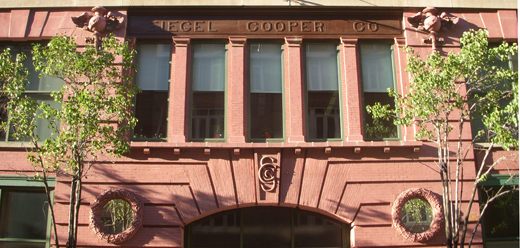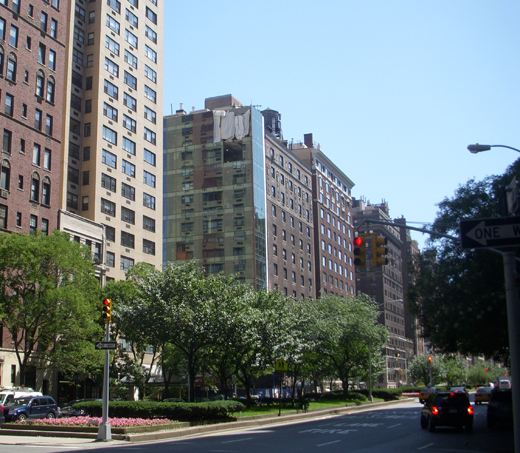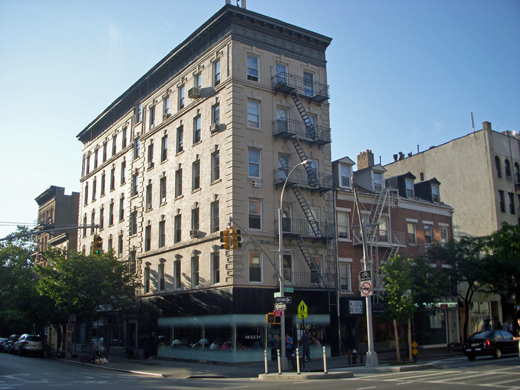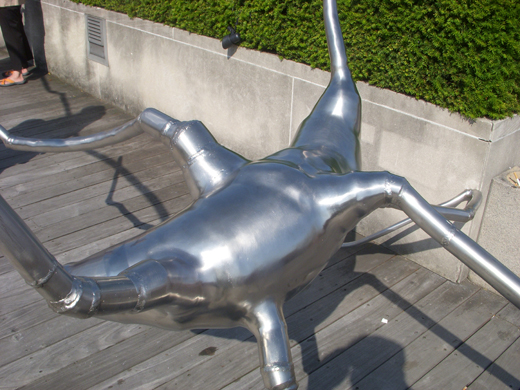
Notwithstanding Kathleen’s convalescence, we had a good weekend, which I rather think we were owed. I had a wonderful sense of being ahead of schedule, whatever that means. What difference does it make whether I finish reading The Economist before 2 PM or before 3 PM? I don’t know why, but it makes a big difference. I’m learning that the passage from 2 until 4 is the tricky part of my day; the morning ends at around 2 (finally!), and the evening begins at 4 (already?). With only two hours of afternoon, it’s no wonder that I get edgy. It would be nicer, though, if I had a clearer idea of this Platonic ideal that my schedule is pinned to — and where it came from.
***
What if I gave away all but three or four cookbooks, and stopped reading Saveur? What if I threw away all the food catalogues? I think I’d be happier — I do! — but I’m not willing to risk having to buy new copies of all those cookbooks. Perhaps I ought to experiment with the catalogues and the magazines, though. Talking with Ms NOLA the other day, I realized (or said out loud for the first time) that I already know everything about cooking that I’m ever going to need or use.
This certainly doesn’t mean that I plan to rely on the same old recipes for the rest of my life. Quite the reverse, in fact — and that’s the point. I have a sound culinary technique, I know the foods and the flavors that I like, and I’m far more likely to turn out a good dish by relying on my own imagination than by following somebody else’s ideas.
This afternoon, for example, I was casting about for a sauce for cold salmon. Kathleen couldn’t eat mayonnaise (just to be safe), and dairy was out as well. But the doctor had excepted yogurt from the dairy ban, and I decided to except avocado from the raw-vegetable ban. I happened to have a tub of plain Greek yogurt in the fridge, and a perfectly ripe avocado in the vegetable basket. I had already run downstairs for a bunch of dill: preparing to poach the slice of Scotch salmon, I’d sniffed the jar of dried dillweed and smelled only dust. And, for that prized frugal touch, I had a quietly aging half-lemon lying on the counter. Into the food processor with all of it!
The result was not perfect. The taste of (one) avocado was muted by the plain yogurt. And a teaspoon of curry would have added significant interest, if (a) Kathleen weren’t convalescing and (b) I’d whipped up the sauce about three hours earlier. To thin the sauce, which was thicker than mayonnaise, I added a few tablespoons of water — which felt very odd but which was just right, as I needed liquidity without (extra) flavor. The sauce, spooned over the chilled salmon, went delightfully with steamed zucchini slices as well. Capellini tossed with parmesan cheese completed the summer-luncheon plate.
I’m sure that the avocado-yogurt-dill-lemon sauce appears in a million cookbooks. It’s even possible that I followed a recipe for it once, long ago. It really doesn’t matter. Originality is not the name of the game.
When I asked Kathleen yesterday what she wanted for dinner, I could see her flesh crawl at the prospect of yet more chicken. But the more robust choices were out. How about veal, she asked. So I toddled down to Agata & Valentina and bought a nice rib chop. This I rubbed with a drop of oil and a tablespoon of crushed sage. Broiled for eight minutes on each side, the chop was done to perfection, retaining the faintest blush of pink at the center. I served it with haricots verts and Yukon fingerlings. The potatoes were steamed, and Kathleen had hers plain, without the butter that I swirled mine in. The beans were snipped, parboiled, and sautéed — in Benecol. The Benecol didn’t fool me into thinking that the beans were buttered, but it came close enough.
***
At Crawford Doyle on Friday afternoon, I remembered that Ms NOLA had strongly recommended reading Peter Cameron’s Someday This Pain Will Be Useful to You. She also assured me that I’d “knock it off in a day.” Which indeed I did, even though I didn’t start reading it until late yesterday afternoon. I not only read it, I read most of it aloud to Kathleen, while she knitted receiving-blanket prototypes. I was hugely moved.
Well, as you know, I’m hugely moved all the time — I’m lucky that way. But yesterday’s movement was more of a scraping. The way that I’ve developed of remembering my adolescence was what got scraped away. So much of Mr Cameron’s book reminded me of what my teens were really like — which was somewhat surprising, since the novel’s narrator was born in 1985 or thereabouts, nearly forty years later than I was. You’d think that our experiences of adolescence, given everything that has changed, would be rather different, but no.
James Sveck is a very intelligent graduate of Stuyvesant High, class of ’03. He spends the ensuing summer scheming to avoid going to Brown in the Fall. He thinks that college will be a waste of time, and he is very articulate about why. Reason Number One: he hates people his own age, probably because they are adolescents. This displacement was extraordinarily familiar. Teenagers are supposed to suffer all sorts of existential doubts about themselves, but, like James, what I experienced instead was a conviction about others. Especially other adolescent males.
“What’s so bad about college students?”
“They’ll all be like Huck Dupont.”
“You’ve never met Huck Dupont.”
“I don’t need to meet him. The fact that his name is Huck and he got a full hockey scholarship to the University of Minnesota is enough for me.”
“What’s wrong with hockey?”
“Nothing,” I said, “if you like blood sport. But I don’t think people should get full scholarships to state universities because they’re psychopathic.”
I may have put it better myself at the time, but never mind. Forget Holden Caulfield; I knew how to piss people off big-time. As does James.
There’s one line in the book that screamed RJ! so loud that I felt slightly violated. Having “acted out” — a phrase that sadly didn’t exist in my day — on a school trip, James has been sent to a therapist. After weeks of sessions, the shrink finally confronts James about his meltdown. Typically (I’m speaking from experience), James parries her questions with further questions, as if he were the doctor. But he’s not the doctor. At a crucial point, she gets a rise out of him.
“So you assumed I was arrested?”Â
“I suppose I did.”
“Well, I wasn’t arrested. And the so-called trouble with the police wasn’t my fault. It was my parents’. They got the police involved. They filed a missing persons resport. If they hadn’t done that, everything would have been fine. Or less bad.”
“Were you missing?”
I realized she had tricked me into talking about what had happened in Washington, and even though I felt okay about talking about it, I wanted to make it clear I was aware I had been tricked, so I didn’t answer.
I think you could say that I spent my youth — not just my adolescence, but my the years between the time when I was first commanded to play baseball (to which I responded with a passive ressistance that I did not need Gandhi to teach me, perhaps because even in fourth grade I was larger than Gandhi) and the time when I decided to buckle down and study for the law boards — you could say that I spent my life “making it clear.”






















